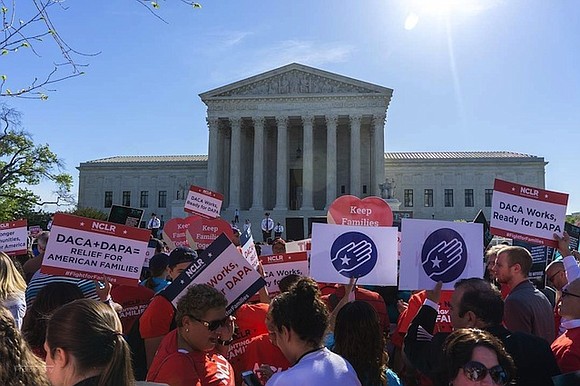The Next DACA? Trump Administration Turns to Another Class of Immigrants
CNN/Stylemagazine.com Newswire | 9/11/2017, 6:59 a.m.

By Tal Kopan, CNN
(CNN) -- As the nation's immigrant community grapples with President Donald Trump's decision to end the Deferred Action for Childhood Arrivals program, a similar move could be looming for hundreds of thousands of other undocumented immigrants who have been permitted to build lives in the United States, in some cases for decades.
At issue is "temporary protected status," a provision of immigration law that allows the government to grant temporary work authorizations and protection from deportation to undocumented immigrants from certain countries where life remains dangerous. Conditions that could merit the status include armed conflict and civil war, natural disasters, epidemics and "other extraordinary and temporary conditions."
The status is intended to be temporary, but many of the designated countries have had their crises continue for years, resulting in certain groups' protections lasting for decades.
In the next six months, the Trump administration will weigh whether to extend the status for several countries whose immigrants have lived in the United States for as long as 20 years -- with a decision to end that status potentially upending their lives. All told, more than 440,000 people in the United States are protected by the program.
By November, the Department of Homeland Security must make a decision about Sudan and South Sudan; there are 1,039 temporarily protected immigrants from Sudan in the United States and 49 from South Sudan, according to US Citizenship and Immigration Services.
The deadlines for decisions on Haiti, Honduras and Nicaragua, which have much larger populations of temporarily protected immigrants in the United States, are in January. Haiti's temporary protected status was set to expire in July, but former Homeland Security Secretary John Kelly, who has since become White House chief of staff, opted to extend it for six months.
But when Kelly extended the status for Haiti, which was designated in 2011 after an earthquake devastated the island, he warned the nearly 58,700 recipients living in America to prepare their affairs for going back to Haiti or find another way to apply to stay in the United States.
That sent a shock wave through the broader community of temporarily protected immigrants, which fears the warning was a sign of things to come.
More than 86,000 Hondurans and more than 5,300 Nicaraguans are protected under the program.
El Salvador's temporary protected status is up for reconsideration in March. Salvadorans make up more than 263,000 of the immigrants who are temporarily protected, and they have been living in the United States since 2001.
Trump has been especially harsh on immigrants from Central America in public remarks, blaming them for violence by the gang MS-13, which exists in its largest concentrations outside the United States in El Salvador, Honduras and Guatemala. That further adds to the concern that acting Homeland Security Secretary Elaine Duke could decide to end the protections for Central Americans.
"It's going to be devastating to those families (if the program ends), and they typically are families, so you often have children that have grown up in the United States, people who are gainfully employed, settled in communities," said Leon Rodriguez, a former director of USCIS now working as an immigration attorney. "So the impact from a family perspective, from a workplace perspective, from a community perspective, it's quite, quite serious."
According to the rules, not everyone from the countries designated is automatically protected. Only people who can show they've continually lived in the United States since the triggering event -- or subsequent designation times -- are eligible.
For example, Sudan was first designated in 1997 and was redesignated in 1999, 2004 and 2013.
To qualify for protections from El Salvador, recipients must have lived in the United States since 2001, and for Honduras, it's 1998, meaning any revocation of the program would upend lives built in the United States for nearly 20 years.
Lawmakers have been pressing the Trump administration to preserve temporary protected status for the countries whose deadlines for redesignation are coming up soon, citing the communities that would be harmed. At a meeting in July with members of the Congressional Hispanic Caucus, then-Homeland Security Secretary John Kelly indicated he could end Haiti's status but hadn't made a decision on Central America.
In addition to the humanitarian concerns, supporters of the program point to analyses that show an economic impact from revoking it.
"If El Salvador terminates, literally 260,000 eligible workers will fall out of the workforce at the stroke of midnight on whatever day that happens," Rodriguez said.
An analysis by the Immigrant Legal Resource Center, which advocates for pro-immigration policies, found that deporting all the immigrants from El Salvador, Honduras and Haiti who have temporary protected status would cost $3.1 billion and take away $6.9 billion in contributions to Social Security and Medicare and $45.2 billion to the gross domestic product over a decade. Turnover costs for their employers would total nearly $1 billion.
"There's different elements to the concern," said Rep. Zoe Lofgren, a Democrat from California. "First, in the case of people who've been here a considerable period of time, people become members of their community, and so ... a couple decades later, you own businesses, you have families, you have grandchildren, you're kind of part of our situation here."
Lofgren said the designated countries often remain in dire straits, and sending people back to them would be "unwise."
The program is one of the issues that Congress needs to tackle as part of immigration reform because insisting on keeping recipients' status temporary becomes untenable, she said.
"There should be some rational way to transition people who have been here for a long time, and in the case of these people, they've been here in legal status, who because of the length of their stay have basically become valued members of our community," Lofgren said. "That's a matter of a change of immigration law."



